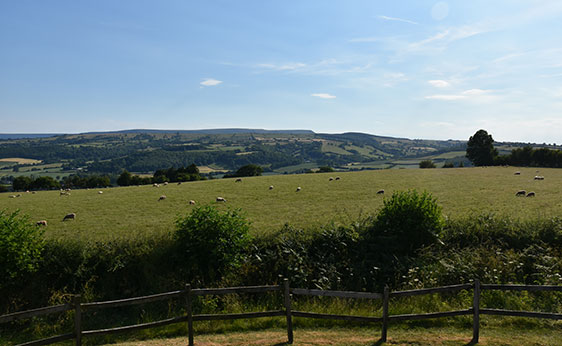Overview
Discover the cultural landscapes of southwest Herefordshire as you join our field school in exploring the rich prehistoric and medieval history of this borderland region between England and Wales. In this unique program, you’ll split your time between two fascinating sites and time periods. Unearth the secrets of Neolithic activity at Arthur’s Stone, a 5,000-year-old megalithic tomb that reveals the sophisticated rituals and craftsmanship of early settlers in Britain. At Snodhill Castle, you’ll delve into the remains of a major Norman fortress, where recent excavations have uncovered layers of history, from remains of its motte-and-bailey fortifications to the remnants of a Royal Free Chapel—a rare and fascinating glimpse into the medieval past. This field school offers a unique opportunity to investigate these intriguing sites while gaining hands-on experience as an archaeologist. Set in the picturesque village of Dorstone, surrounded by rolling hills and quaint villages, you’ll spend your field days and free time alike immersed in the charm of rural England.
Field School Highlights:
- Learn a variety of archaeological field skills, from excavation techniques to geophysical surveys, under the guidance of commercial archaeologists.
- Work alongside local British students and create lasting international friendships.
- Immerse yourself in the scenic beauty and rich heritage of Herefordshire, with opportunities to visit nearby attractions and soak in the rhythms of life in a traditional English village
| Course Details | |
|---|---|
| Course Dates | June 28-July 26, 2025 |
| Course Type | Field Archaeology, Prehistoric, Neolithic |
| Instructors | Prof. Julian Thomas & Prof. Keith Ray |
| Credits* | 8 semester (12 quarter) |
| Apply By | March 1 |
| Fees Due By | April 15 |
| Program Fees | (2025) |
|---|---|
| Tuition | $3,800 |
| Transcript Fee* | $300 |
| Health & Evacuation Insurance | $130 |
| Room & Board | $740 |
| TOTAL: | $4,970 |
This program is full and is no longer accepting new applications.
Email admissions@ifrglobal.org to ask about joining the waitlist.
Instructors
The directors welcome emails and inquiries about the research elements of this project. More general information (tuition, health insurance, and payment schedule) can be found under the ‘Students’ tab above. Any further questions may be addressed to IFR staff. Additional details about research, course schedule, travel, accommodation, and safety can be found on the syllabus. Contacting the directors or the IFR office is encouraged and appreciated. It may help you determine if this field school is a good fit for you.
Testimonials
No student testimonials are available at this time.
Payment & Student Fees
Application Fee: There is a $45 fee to submit an online application.
Deposit Payment: A nonrefundable $500 deposit is due within 3 weeks of program acceptance in order to secure your place. The remainder of your program fees are due by the deadline indicated under “Course Details”.
*Transcript Fee & Academic Credit Opt Out: If you wish to participate in an IFR field school without earning academic credits, you will not be charged a transcript fee.
For more information about payment, fees, and policies, please see details under our Payment & Finances and Withdrawal and Cancellation Policy pages.
Accommodations
Our campsite is the cricket field in Dorstone village, which we have exclusive use of during the fieldwork period. There is a pavilion with showers and toilets, and another building used as a kitchen. During the fieldwork period we also have a large marquee for dining and social space, and at the bottom of the field, beside the stream, there is a space for a campfire. We will request students to each occupy a separate tent, and to pitch their tents at least two metres apart (for reasons of fire safety). Launderettes are found in Hereford and Hay-on-Wye, and washing can be collected and sent in for a service wash during the week. You can also hand-wash clothes at the campsite.
Individual tents and sleeping mats will be provided for all IFR participants, but you will need to bring a sleeping bag.
During fieldwork, our food is prepared by a cook employed by the project. There is a hot meal each evening, a variety of breakfast options, and a choice of sandwiches delivered to the site at lunchtime. We are happy to accommodate vegetarians, vegans, gluten-free, food allergies and intolerances, halal, kosher and other diets. One of the tasks of the day’s kitchen staff will be the rigorous cleaning of all food handling and preparation spaces.


Travel Info
Natural disasters, political changes, weather conditions and various other factors may force the cancellation or alteration of a field school. IFR recommends students only purchase airline tickets that are fully refundable and consider travel insurance in case a program or travel plans must change for any reason.
General information for this program is below, but keep in mind we will discuss any updated travel information and regulations during the required program orientation, which could affect travel plans.
Updated for 2025 season: You should fly into London Heathrow airport on Saturday 28th June 2025. Try to get a flight that arrives before 1:00 pm BST. From Heathrow, you should take the train to Hereford (about 3 ½ hours). We will collect you from Hereford station – pickup times will be arranged once studnets submit their travel information.
If you missed your connection or your flight is delayed, please call, text or email the field school director immediately. A local emergency mobile phone number will be provided to all enrolled students.
Both excavation sites are very close to the campsite. While either could be walked in under half an hour, we will convey all personnel to site by minibus each day.
VISA REQUIREMENTS
While US citizens do not require visas for travel to the UK, there is an electronic travel authorization (ETA) that must be completed before entry. You should submit it at least a week before your travel.
Citizens of countries not covered by the ETA process are asked to check the embassy website page at their home country for specific visa or entry requirements.














